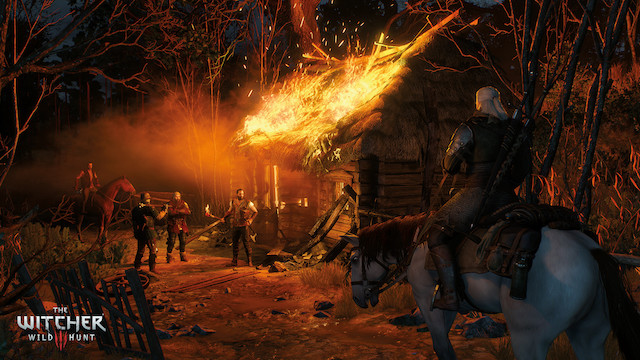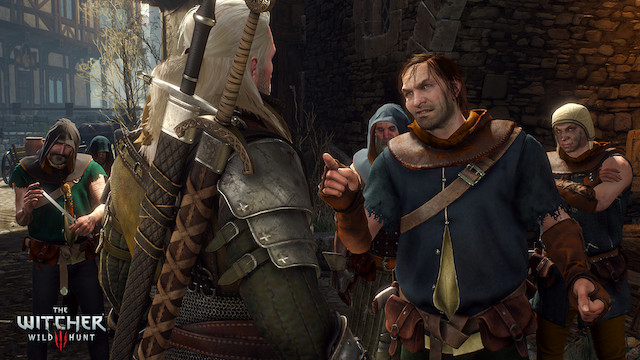When everyone talks about The Witcher 3: Wild Hunt, they love to talk about just how big it is and that they can’t get enough of it. Most people have reported over eighty hours before completing it, if not more. There’s no real downside to you, the consumer, with this. With overpriced corridor tech demos like The Order: 1886, it’s become a very tricky deal figuring out which games are worth your money.
The Witcher 3 not only offers a giant, deep, highly replayable game, but has additional content rolling out throughout the weeks. This is great, right? Well… not for everyone, actually. Believe it or not, it’s games like these that can break even the most laser focused and skilled game critic. I’ve been lucky thus far, but it finally happened.
The Witcher 3 broke me.
When you’re a game critic, unless you deal primarily in older games, you are expected to get reviews out promptly. If you’re more than two weeks past release, you get barely a quarter of the views you’d normally get. At best, if you have a following, at least most of them will watch it. If you don’t, then you’re just stuck with a lot of time wasted on a game.
You probably only play a game like The Witcher or Dying Light or Assassin’s Creed at a leisurely pace. Maybe one or two hours a night, or a couple hours over the weekend. A game critic doesn’t get that kind of leisure. We’re expected to get through a game in time to meet the release date, if we get lucky enough to receive an early review code. If not, we have to review the game after release even faster.

During my busiest review season, back during the close of 2013 at the first site I ever worked for, I had to complete the following all between Black Friday and December 31st:
- Splinter Cell: Blacklist
- Assassin’s Creed IV: Black Flag
- Ratchet & Clank: Into the Nexus
- Ratchet & Clank: Full Frontal Assault
- Battlefield 4
- Injustice: Gods Among Us Ultimate Edition
That’s in addition to conducting interviews, previews, and writing news articles. If I recall correctly, I finished Assassin’s Creed IV: Black Flag over the course of Christmas week, between festivities. Yet, despite the craziness of it all, at the time, I just thought this was how things were supposed to work.
Adam Sessler spoke once about when he started reviewing Grand Theft Auto V, that he talked to his wife and he basically was in isolation for the most part, spending the good part of three weeks completing the game pretty much nonstop. As I look back on it now, I see how ridiculous an idea this is, and how maddening the situation has become for AAA game critics.

I want to be clear — this isn’t a pity party. Being a game critic is a job, and jobs aren’t always fun, but it is our job to inform you whether or not to buy a game. How are we supposed to get the same impression from a game you will, if we cannot play games at a reasonable pace and with the right mindset?
I want to be able to, without a doubt, tell you whether or not you’ll like a game, but that requires I actually engage with the game. I already talked about how reviewing with my synesthesia impacted my perspective on games. Now imagine the stress of trying to finish a game for a deadline feels. It’s not exactly going to endear you to a game.
Rushing through a game that is taking too long is like eating a delicious cake, and having it turn rancid in your mouth. I hated Alien: Isolation‘s finale because it. just. kept. drawing. it. out! I had spent four days straight trying to beat it in time, and I just wanted it to be over.
The last response you want to have to a game is screaming “END ALREADY!” That negative energy is going to stick with you when you’re writing the review, and trying to recall your experience. Which brings us back to The Witcher 3.

You see, I really like The Witcher 3. I feel it has some genuine problems, some that could be patched out later, and others that are fundamental issues with how CD Projekt RED designed the game. Still, it’s a rock-solid title and one of the best new-gen games out there. So I don’t want to walk away almost hating the game, just because of an imaginary rule that so many game critics follow.
It’s time for game reviews to get an update.
The change is happening, slowly. As smaller websites like Elder Geek and solo-critics like TotalBiscuit grow in prominence, we’re seeing a shift in how reviews are handled. There’s no longer just one way to review a game, and said reviews are being valued more for the opinions and rhetoric than as just another metric for a game’s Metacritic score.
It may seem like a silly thing to even debate about now, but it’s practices like these that have pervaded the industry far too long.
With this advent of new, more consumer-level criticism, there’s finally a new avenue for game reviewers. It might not generate a thousand views in a day, but you also can make a more substantial, well-thought-out case in the meantime. Which means you get to make your own schedule. It doesn’t solve every problem, but it at least helps.
It may seem like a silly thing to even debate about now, but it’s practices like these that have pervaded the industry far too long. As the lines between critic and consumer begin to blur, we can take advantage of the new opportunities offered us. I just had to have my entire work week screwed over by The Witcher 3 to see it. Weirdly enough, thanks for that, Witcher 3.







Published: Jun 5, 2015 03:35 pm